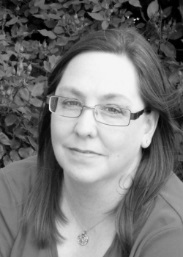Twisting Topeka (28 page)
Authors: Lissa Staley
Tags: #what if, #alternate history, #community, #kansas, #speculative, #library, #twist, #collaborative, #topeka

What writing advice would
you give to other writers?
Just write. Make time for it, and do
it. If you’re excited about something, share it. If you’re not, put
it in a drawer. But write. If you want to get better, read books on
how to get better. Share what you’ve written with other writers.
Agree with them, disagree with them, but share with them. And then
write some more.
How do you make time for
writing?
Writer’s block is wanting not to write;
you can always put something down on paper if you want to. A great
way to make time to write is to plan an evening at a coffee shop or
the library; bring a friend along to keep you accountable. Having
already missed a deadline is also a great motivator, but I don’t
recommend that one!
Marian
Rakestraw
Native Son

Marian Rakestraw
was born in South Dakota, but has spent the vast
majority of her life living everywhere else. After arriving in
Topeka, she joined NaNoWriMo and took up the isolating,
nerve-frying, confidence-rattling task of writing fiction as a fun
way to meet new people. It worked wonderfully. Since then she has
churned out 50,000 words for four consecutive Novembers and
contributed to the Community Novel Project on five occasions. She
is going to finish revisions on her 2014 NaNo novel very soon.
Honestly. Her husband is notably spectacular, and together they
have two charming children, a zaftig dog, and a weirdly social
cat.
Why did you want to
participate in the Community Novel?
This project is a great
example of how the library tries to build community. In this case,
it brought me in contact with great writers and editors I wouldn’t
have met otherwise.
What was the inspiration
for writing your story?
I struggled to find a subject. I knew I
wanted to use an alternate history angle rather than writing
speculative fiction. I’m a good researcher, but lousy at writing
about zombies. I tried and discarded a series of ideas before
finally settling down and forcing myself to write a story. The
mural of John Brown is so remarkable that it fed me the rest of the
idea.
What have you learned about
writing fiction from participating in this project?
Writing short stories is hard! I’m
usually a fairly concise writer, but stripping every nonessential
idea and word from a story is insanely difficult. I have renewed
respect for writers who can do it well.
What is your writing
background? What do you usually write?
When left to my own devices I write
Middle Grade fiction. Talking animals creep into my stories with
alarming regularity. I love the freewheeling atmosphere of National
Novel Writing Month and the permission it gives me to write
absolutely anything that pops into my head. I’m also surprised by
how often that unrestricted attitude results in words I keep in the
final copy.
How do you make time for
writing?
Confession time. I don’t make time for
writing unless I box myself into a corner. I love deadlines because
they force me to produce. Truly, the butt in chair method is the
only way I manage to turn the idea of writing into the act. Also,
I’m easily distracted and will grasp on to anything that will save
me from having to get the words out. Consequently, my current
writing lair is in the unfinished back corner of the
basement.
Leah Sewell
Tunnels

Leah Sewell
is the Communications Editor for the Topeka and
Shawnee County Public Library, which basically means she’s an
observer, collector and creator of library stories. She’s a veteran
publisher and magazine editor who has brought her passion for all
things literary and writerly to library marketing. Leah has an MFA
in writing from the University of Nebraska, is a published poet and
author, a graphic designer, and has a very healthy obsession with
books, podcasts, art and from-scratch cooking. She lives in Topeka,
Kansas with her two wily kids and a similarly unruly to-read
pile.
Why did you want to
participate in the Community Novel Project?
It’s a fantastic program at the library
and I want to support the work that Lissa and Miranda are doing,
because I work here too. And because I work here, I know that this
program is basically famous among librarians internationally. Its
model is being mimicked all over by other libraries. But, also, I
love to write and sometimes need the accountability. The
collaborative nature of the program requires that you get your
stuff in, and that means you’re writing. It is yet another way to
keep writing.
What was the inspiration
for writing your story?
When I first moved to
Topeka
–
I’m
originally from Chicago
–
I lived in the pleasant, quiet College Hill
neighborhood and thought, mistakenly, that Topeka was pretty
vanilla and plain. It struck me as a stereotypical quiet,
conservative Midwestern town. Then, one day, my boyfriend at the
time and I went for a ride on his vespa and he pulls onto this
small, winding road, and out of nowhere appears a huge, beautiful,
castle-like Austrian architectural building with turrets and a
steep sloping roof, and it’s obviously abandoned. We dismounted and
he told me its story. The Topeka State Hospital was one of my
favorite places in Topeka because it was so very visually rich, but
also just bursting with history and symbolism. It was a totally
unique place and it lent Topeka as a whole an air of mystery and
that feeling of its many secrets lurking below a surface. It broke
my heart when they tore it down. When I was thinking of alternate
or speculative fiction, I thought about Topeka’s history of
demolition and the ghosts
–
those histories and
memories
–
that get
left behind.
What have you learned about
writing fiction from participating in this project?
I’ve learned that my perception of the
differences between poetry and short stories is that there doesn’t
need to be too much separation. I write very lyrically when I’m
writing short fiction. I’m about 85% poet, so this is natural. But
with my previous CNP participation, I was asked to write a chapter
of a novel, and that came out more prosaic. With the short fiction
medium, I felt freer to let more of my poet-self loose. I also
learned that writing genre fiction is hard. Like, really hard. I’m
still not sure I accomplished the genre part of it. I need to read
more speculative fiction to sharpen my edge in the genre, to be
sure.
Liss
a Staley
Love and
Friendship

Lissa Staley
first came to Topeka in mid-2001 to “practice her
job interviewing skills” and has worked a Book Evangelist and
Librarian at the Topeka and Shawnee County Public Library ever
since. She spotted a book display advertising NaNoWrimo in fall
2003 and by December 1 she wrote her first 50,000 word novel. She
writes a different first draft of a novel every November and
motivates other writers as the NaNoWriMo Municipal Liaison for
Topeka. She thrives on deadlines and only revises and publishes
fiction as part of the Community Novel Project. She hopes library
programming encourages you to write and publish your own lovely
novel, preferably with a romantic happily ever after ending. Her
children will both be students at a public high school in Topeka in
2026.
Why did you want to
participate in the Community Novel Project?
As a librarian, I value instructive
books and research articles for learning new things. That said, the
Community Novel Project is different and awesome because I learn
directly from experiences with other writers and from this hands-on
example throughout the conception, planning, writing, feedback,
editing and publishing process. We may feel like we could write a
how-to-do-it book after we are done, but we gained the knowledge
together by doing.
What was the inspiration
for writing your story?
An early draft of my story
was set 50 years in the future and based generally on ideas about
the economy and school budgets continuing to struggle, but when
another writer submitted a story with a similar setting, I chose to
rework my story for the near future instead. Real life events
made my story unexpectedly quite relevant, with the newspaper
headline in the
Topeka Capital
Journal
on June 1, 2016 --the day we sent
our stories for peer feedback -- speculating “What could happen in
a Kansas school finance showdown.” One fellow writer who had
originally provided feedback that the end of physical public
schools was unrealistic in my 10 year time frame later wrote me to
take back the comment, given the dire emerging news stories that
forecast even worse scenarios.
What have you learned about
writing fiction from participating in this project? What have you
learned about self-publishing from participating in this
project?
My learning experiences from this
project were all tied to the peer feedback. Having feedback from 3
fellow writers, plus my 90 year old Nana, gave me different
suggestions and perspectives to consider. I loved their compliments
– that felt great and validated the hard work that I put into
developing my characters’ voices. I liked the critical and
constructive feedback more than I thought I would. Instead of just
proofreading for grammar on my next draft, I did some serious
revision. I tried to address the overall comments as well as the
specific places where readers reported they were pulled out of the
story, or found the phrasing awkward, or suggested missing content,
or even once instance where a beta reader wanted to “reach through
the computer and smack [the character]”.
What real-life alternate or
speculative twist for Topeka do you anticipate or fear?
Issues around school funding and social
inequality weigh heavily on my mind. I hope we find better
solutions for our kids and our community.